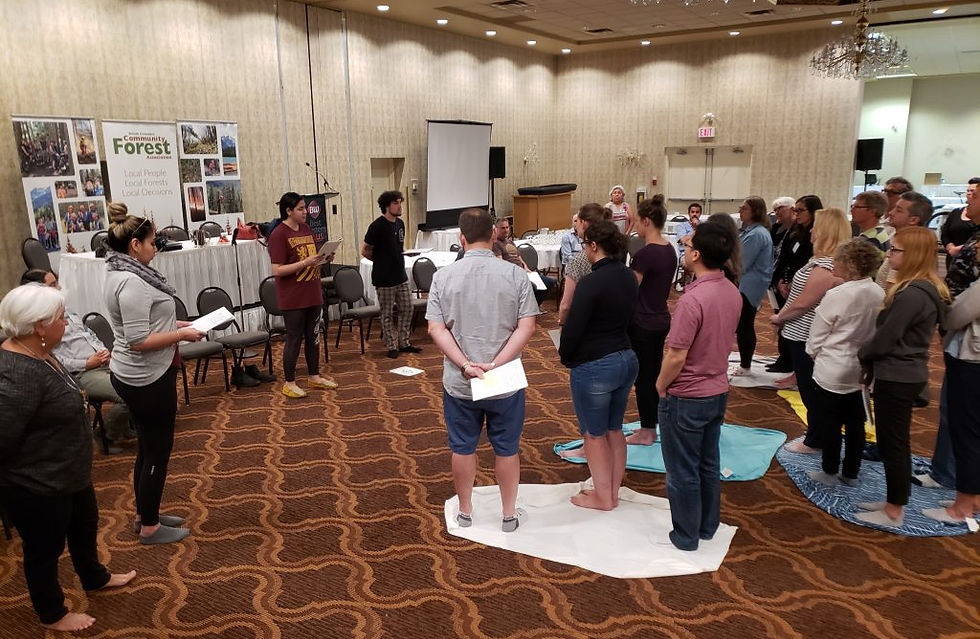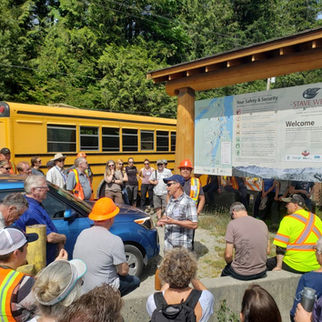
2019 Conference and AGM
June 12–14, 2019 Mission, BC
Thank You Mission Municipal Forest for hosting a wonderful conference, thank you to all of our sponsors for your support and to the record number of participants for attending and contributing to a very successful event!
The 16th annual conference and AGM was held the unceded, ancestral and shared territory of the Coast Salish Sto:lo People. We are grateful to all of our participants, speakers, sponsors, exhibitors, BCCFA board and staff for their involvement, networking and support for the positive future of community forestry.
PHOTOS
After the field trip, participants, sponsors, and special guests enjoyed a welcome reception. Then, on Thursday, 13th the conference was in full swing with a day of presentations on a range of topics.
Following a wonderful day of presentations, the annual awards banquet and silent auction was held.
The last day of the conference began with the BCCFA AGM, followed by a special session on Reconciliation through Education and Understanding where attendees participated in The KAIROS Blanket Exercise™ .
Conference Presentations
Session 1 – How Community Forests are Changing the Way BC’s Forests are Managed—The Year in Review
Many in the forestry sector today understand that we need to do things differently. As we look to find ways to advance reconciliation with Indigenous people, to become more responsive to a changing climate, and to create healthy and resilient forests and communities, community forests offer a tangible solution. The BCCFA advocates for more and larger community forests and for forest policy that enhances the ability of CFA holders to create benefits for their communities and to the province. In this presentation, Jennifer provided an overview of the BCCFA’s work over the past year and highlighted the findings of a new socio-economic impact study of BC’s community forest program as well as the results of the latest Community Forest Indicators Survey documenting the benefits generated by BCCFA members.
Session 2 – The 4 Pillars of Disaster Management: Community Forest Leadership & Innovation
Moderator: Steve Kozuki, Executive Director, Forest Enhancement Society of BC (FESBC)
Resiliency and Adaptation in the Context of Changing Fire Behavior and Effects
-
Bob Gray, Association for Fire Ecology, Certified Wildland Fire Ecologist, R.W. Gray Consulting Ltd.
Climate change is predicted to lead to longer fire seasons, increased burned area and greater fire severity. This may in turn lead to a significant increase in the economic, social and environmental burden of wildfires. Under rapidly changing climatic and wildfire conditions is it possible to promote resilience, is the concept of resilience even relevant, and what would resilience and adaptation look like. In this presentation, Bob presented the latest science on climate change and wildfire and then presented some thoughts on resilience and adaptation.
Managing for Multiple Values
Forest professionals that support the management of community forests are required to juggle ever more environmental, economic and social objectives. This stewardship trinity can be challenging to everyone involved. How do we sustain and protect our community’s best interests? Is there room for every value and/or every voice? The Logan Lake Community Forest shared their experience and understanding of wildfire prevention and mitigation since 2004; all the while leveraging their knowledge of resilient forests, legal/ non-legal requirements and markets. We are challenged to think differently. There is an “I” in “Team” and Garnet showed us where we can find it in our communities too.
Good for the Hood – FireSmart for Private Land
Jessica spoke about the shared responsibility of FireSmart and the seven disciplines that make the program successful. She brought case study examples and promoted the importance of engaging the community to be active in FireSmart efforts.
Voice of Experience – Steps to Building Your Own Crew
Cedar and Margaret gave an overview of Khowutzun Forest Services and their contract firefighting crews, describing fire prevention in their Community Forest and fire related activities province‐wide.
Restoration, Reclamation, Reforestation with Native Species
Ron shared his deep knowledge of the value of native species and their role in fire and ecosystem recovery efforts.
Session 3 – First Nations Reconciliation Panel
Moderator: Doug Stewart, Director Tenures Branch, MFLNRORD
What does reconciliation mean to you? What role do community forest managers and boards have in reconciliation? The importance of reconciliation and building relationships with Indigenous People is highlighted by the federal and provincial commitments to implement the United Nations Declaration for the Rights of Indigenous Peoples (UNDRIP) and the principle of free, prior, and informed consent (FPIC). In addition, the context for forestry in BC has changed significantly in relation to Indigenous peoples in the past 10 years. The provincial government has provided volumes/tenure to First Nations as accommodation, economic development, and land management control. Where community forests are working with Indigenous governments, effective relationship approaches and partnerships are key to successful forest management.
Andrea spoke about her understanding of the meaning of reconciliation, with examples of reconcilACTION (the implementation of reconciliation) for community forests.
Garry helped us understand reconciliation and how to personalize it in our lives, particularly as it relates to the collaborative management of our forests with First Nations.
The Williams Lake Community Forest is a partnership between the Williams Lake Indian Band and the City of Williams Lake. Hugh and Tom will speak to the benefits and opportunities for building relationships inherent in a community forest tenure, based on their shared experience in the Williams Lake Community Forest.
Session 4 – Provincial Policy Update
Moderator: Jeff Mc Williams, BA Blackwell and Associates
Over the last two years, the Province of British Columbia has initiated engagement processes and action on numerous aspects of forest policy. With 94 per cent of the land and forest resources in BC under tenure arrangements, the province is challenged to meet new demands. Innovation and initiative are required to respond to a changing climate and wildfires, global economics, First Nations rights and reconciliation, mid-term timber supply and the needs of forest communities. The BCCFA is engaged in these processes, representing the needs and interests of community forests. In this session, key Ministry of Forests, Lands, Natural Resource Operations and Rural Development representatives charged to move these initiatives forward provided updates and answered questions from participants.
-
Jim Schafthuizen, Executive Director, Forest Policy and Indigenous Relations Division, Ministry of Forests, Lands, Natural Resource Operations and Rural Development (No presentation)
Jim presented on the provincial policy changes associated with the Coast Revitalization process and the plans for the Interior Renewal process. The two processes are intended to address market conditions, trade relationships, changing technology and business practices.
Diane spoke to the multi-year, incremental process to improve the Forest and Range Practices Act (FRPA) initiated by the Province. The improvement initiative began with initial enabling changes in spring 2019 and is moving into comprehensive changes to the Act and regulations that are being developed with the participation of First Nations, local government, stakeholders, industry and professional associations over the next few years.
Forest management is an ever changing practice that responds to evolution in values, science, world economies and technology. How do we move from the forest management we have today and meet the challenges posed by climate change? What does a low carbon economy mean for the sector? How will we work together to support communities and maximize values on the land base? Forest carbon and the bioeconomy bring some new thoughts to the discussion.
Managers’ Meeting – Facilitated by George Brcko, BCCFA President and Jennifer Gunter, Executive Director, BCCFA
This two-hour session began with a presentation by Julie MacDougall, Director of Resource Practices Branch and Norah White, Manager of Resource Practices Branch on the Forest and Range Practices Act (FRPA) Improvement Initiative.
Board of Directors’ Governance Session
Facilitated by Susan Mulkey, Manager of Communication and Extension, BCCFA
This session began with a presentation by:
Gordon provided a high-level overview of the work of the BC Rural Centre and its work in supporting the creation of community investment cooperatives as a mechanism to invest local funds into local businesses.
Session 5
Moderator: Susan Mulkey
-
Meike Siegner, UBC Graduate Student, Faculty of Forestry
Drawing from a qualitative study on managerial decision-making in community forests in BC, Meike will report on insights into the nature and scope of the managerial role in community forest organizations, and how management can effectively balance business and community goals and values.
Session 6
Moderator: Alison Krahn, Program Manager, Indigenous Initiatives, UBC Faculty of Forestry
Incorporating Traditional Values into Forest Management
To fully understand traditional values on the land, we must first understand that each First Nation is unique and that they have their own values which drive their management goals. For the Secwepemc, knowledge of forest management is passed on through oral history and thousands of years of observation, teachings and guidance from the Creator. This knowledge is then incorporated into their laws and governance.

Our Host the Mission Municipal Forest
The Mission Tree Farm Licence #26, also known as the Mission Municipal Forest, has been a member of the BCCFA since inception in 2002. It was formed in 1958 as an outcome of the report from Gordon Sloan and the Royal Commission on the Forest Resources of British Columbia of 1945, where there was a recommendation that municipalities manage the local forests. Operating for over 60 years, Mission will share their experiences of addressing the challenges of managing their area based working forest in the lower mainland, access management, recreational interests, educational programming and deepening relations with their First Nations neighbours.
Photos from the field trip—Missing Link
[fshow url=https://flic.kr/s/aHsmENGDcg]
Photos from the conference and AGM—Missing Link
[fshow url=https://flic.kr/s/aHsmENHf3y







